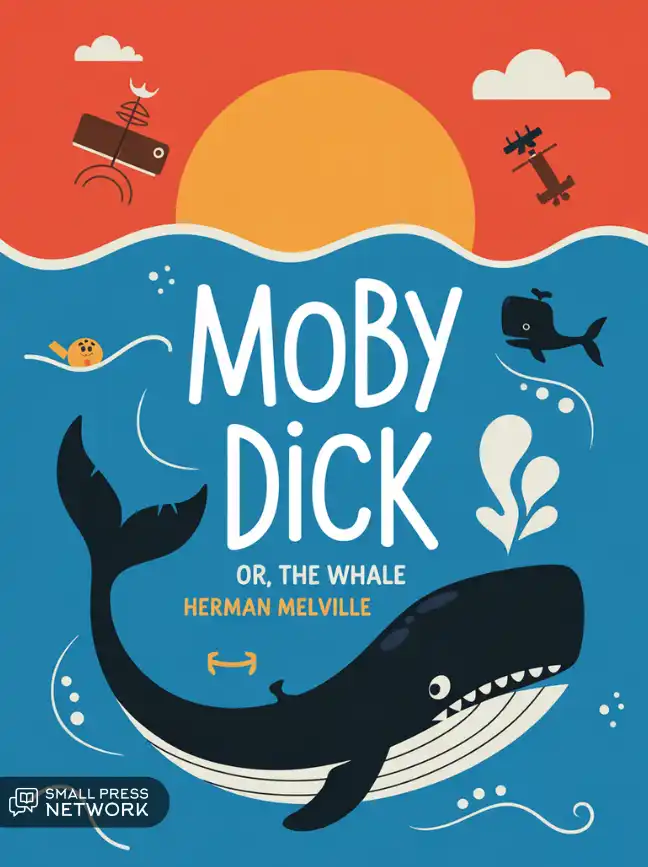CHAPTER 71
The Jeroboam’s Story
Hand in hand, ship and breeze blew on; but the breeze came faster than
the ship, and soon the Pequod began to rock.
By and by, through the glass the stranger’s boats and manned mast-heads
proved her a whale-ship. But as she was so far to windward, and shooting
by, apparently making a passage to some other ground, the Pequod could
not hope to reach her. So the signal was set to see what response would be
made.
Here be it said, that like the vessels of military marines, the ships of the
American Whale Fleet have each a private signal; all which signals being
collected in a book with the names of the respective vessels attached, every
captain is provided with it. Thereby, the whale commanders are enabled to
recognise each other upon the ocean, even at considerable distance, and
with no small facility.
The Pequod’s signal was at last responded to by the stranger’s setting her
own; which proved the ship to be the Jeroboam of Nantucket. Squaring her
yards, she bore down, ranged abeam under the Pequod’s lee, and lowered a
boat; it soon drew nigh; but, as the side-ladder was being rigged by
Starbuck’s order to accommodate the visiting captain, the stranger in
question waved his hand from his boat’s stern in token of that proceeding
being entirely unnecessary. It turned out that the Jeroboam had a malignant
epidemic on board, and that Mayhew, her captain, was fearful of infecting
the Pequod’s company. For, though himself and the boat’s crew remained
untainted, and though his ship was half a rifle-shot off, and an incorruptible
sea and air rolling and flowing between; yet conscientiously adhering to the
timid quarantine of the land, he peremptorily refused to come into direct
contact with the Pequod.
But this did by no means prevent all communications. Preserving an
interval of some few yards between itself and the ship, the Jeroboam’s boat
by the occasional use of its oars contrived to keep parallel to the Pequod, as
she heavily forged through the sea (for by this time it blew very fresh), with
her main-topsail aback; though, indeed, at times by the sudden onset of a
large rolling wave, the boat would be pushed some way ahead; but would
be soon skilfully brought to her proper bearings again. Subject to this, and
other the like interruptions now and then, a conversation was sustained
between the two parties; but at intervals not without still another
interruption of a very different sort.
Pulling an oar in the Jeroboam’s boat, was a man of a singular
appearance, even in that wild whaling life where individual notabilities
make up all totalities. He was a small, short, youngish man, sprinkled all
over his face with freckles, and wearing redundant yellow hair. A long-
skirted, cabalistically-cut coat of a faded walnut tinge enveloped him; the
overlapping sleeves of which were rolled up on his wrists. A deep, settled,
fanatic delirium was in his eyes.
So soon as this figure had been first descried, Stubb had exclaimed—
“That’s he! that’s he!—the long-togged scaramouch the Town-Ho’s company
told us of!” Stubb here alluded to a strange story told of the Jeroboam, and a
certain man among her crew, some time previous when the Pequod spoke
the Town-Ho. According to this account and what was subsequently
learned, it seemed that the scaramouch in question had gained a wonderful
ascendency over almost everybody in the Jeroboam. His story was this:
He had been originally nurtured among the crazy society of Neskyeuna
Shakers, where he had been a great prophet; in their cracked, secret
meetings having several times descended from heaven by the way of a
trapdoor, announcing the speedy opening of the seventh vial, which he
carried in his vest-pocket; but, which, instead of containing gunpowder, was
supposed to be charged with laudanum. A strange, apostolic whim having
seized him, he had left Neskyeuna for Nantucket, where, with that cunning
peculiar to craziness, he assumed a steady, common sense exterior, and
offered himself as a green-hand candidate for the Jeroboam’s whaling
voyage. They engaged him; but straightway upon the ship’s getting out of
sight of land, his insanity broke out in a freshet. He announced himself as
the archangel Gabriel, and commanded the captain to jump overboard. He
published his manifesto, whereby he set himself forth as the deliverer of the
isles of the sea and vicar-general of all Oceanica. The unflinching
earnestness with which he declared these things;—the dark, daring play of
his sleepless, excited imagination, and all the preternatural terrors of real
delirium, united to invest this Gabriel in the minds of the majority of the
ignorant crew, with an atmosphere of sacredness. Moreover, they were
afraid of him. As such a man, however, was not of much practical use in the
ship, especially as he refused to work except when he pleased, the
incredulous captain would fain have been rid of him; but apprised that that
individual’s intention was to land him in the first convenient port, the
archangel forthwith opened all his seals and vials—devoting the ship and all
hands to unconditional perdition, in case this intention was carried out. So
strongly did he work upon his disciples among the crew, that at last in a
body they went to the captain and told him if Gabriel was sent from the
ship, not a man of them would remain. He was therefore forced to
relinquish his plan. Nor would they permit Gabriel to be any way
maltreated, say or do what he would; so that it came to pass that Gabriel
had the complete freedom of the ship. The consequence of all this was, that
the archangel cared little or nothing for the captain and mates; and since the
epidemic had broken out, he carried a higher hand than ever; declaring that
the plague, as he called it, was at his sole command; nor should it be stayed
but according to his good pleasure. The sailors, mostly poor devils, cringed,
and some of them fawned before him; in obedience to his instructions,
sometimes rendering him personal homage, as to a god. Such things may
seem incredible; but, however wondrous, they are true. Nor is the history of
fanatics half so striking in respect to the measureless self-deception of the
fanatic himself, as his measureless power of deceiving and bedevilling so
many others. But it is time to return to the Pequod.
“I fear not thy epidemic, man,” said Ahab from the bulwarks, to Captain
Mayhew, who stood in the boat’s stern; “come on board.”
But now Gabriel started to his feet.
“Think, think of the fevers, yellow and bilious!
Beware of the horrible plague!”
“Gabriel! Gabriel!” cried Captain Mayhew; “thou must either-” But that
instant a headlong wave shot the boat far ahead, and its seethings drowned
all speech.
“Hast thou seen the White Whale?” demanded Ahab, when the boat
drifted back.
“Think, think of thy whale-boat, stoven and sunk!
Beware of the horrible tail!”
“I tell thee again, Gabriel, that-” But again the boat tore ahead as if
dragged by fiends. Nothing was said for some moments, while a succession
of riotous waves rolled by which by one of those occasional caprices of the
seas were tumbling, not heaving it. Meantime, the hoisted sperm whale’s
head jogged about very violently, and Gabriel was seen eyeing it with rather
more apprehensiveness than his archangel nature seemed to warrant.
When this interlude was over, Captain Mayhew began a dark story
concerning Moby Dick; not, however, without frequent interruptions from
Gabriel, whenever his name was mentioned, and the crazy sea that seemed
leagued with him.
It seemed that the Jeroboam had not long left home, when upon speaking
a whale-ship, her people were reliably apprised of the existence of Moby
Dick, and the havoc he had made. Greedily sucking in this intelligence,
Gabriel solemnly warned the captain against attacking the White Whale, in
case the monster should be seen; in his gibbering insanity, pronouncing the
White Whale to be no less a being than the Shaker God incarnated; the
Shakers receiving the Bible. But when, some year or two afterwards, Moby
Dick was fairly sighted from the mast-heads, Macey, the chief mate, burned
with ardor to encounter him; and the captain himself being not unwilling to
let him have the opportunity, despite all the archangel’s denunciations and
forewarnings, Macey succeeded in persuading five men to man his boat.
With them he pushed off; and, after much weary pulling, and many
perilous, unsuccessful onsets, he at last succeeded in getting one iron fast.
Meantime, Gabriel, ascending to the main-royal mast-head, was tossing one
arm in frantic gestures, and hurling forth prophecies of speedy doom to the
sacrilegious assailants of his divinity. Now, while Macey, the mate, was
standing up in his boat’s bow, and with all the reckless energy of his tribe
was venting his wild exclamations upon the whale, and essaying to get a
fair chance for his poised lance, lo! a broad white shadow rose from the sea;
by its quick, fanning motion, temporarily taking the breath out of the bodies
of the oarsmen. Next instant, the luckless mate, so full of furious life, was
smitten bodily into the air, and making a long arc in his descent, fell into the
sea at the distance of about fifty yards. Not a chip of the boat was harmed,
nor a hair of any oarsman’s head; but the mate for ever sank.
It is well to parenthesize here, that of the fatal accidents in the Sperm-
Whale Fishery, this kind is perhaps almost as frequent as any. Sometimes,
nothing is injured but the man who is thus annihilated; oftener the boat’s
bow is knocked off, or the thigh-board, on which the headsman stands, is
torn from its place and accompanies the body. But strangest of all is the
circumstance, that in more instances than one, when the body has been
recovered, not a single mark of violence is discernible the man being stark
dead.
The whole calamity, with the falling form of Macey, was plainly descried
from the ship. Raising a piercing shriek—”The vial! the vial!” Gabriel
called off the terror-stricken crew from the further hunting of the whale.
This terrible event clothed the archangel with added influence; because his
credulous disciples believed that he had specifically fore-announced it,
instead of only making a general prophecy, which any one might have done,
and so have chanced to hit one of many marks in the wide margin allowed.
He became a nameless terror to the ship.
Mayhew having concluded his narration, Ahab put such questions to him,
that the stranger captain could not forbear inquiring whether he intended to
hunt the White Whale, if opportunity should offer. To which Ahab answered
—”Aye.” Straightway, then, Gabriel once more started to his feet, glaring
upon the old man, and vehemently exclaimed, with downward pointed
finger—”Think, think of the blasphemer— dead, and down there!—beware
of the blasphemer’s end!”
Ahab stolidly turned aside; then said to Mayhew, “Captain, I have just
bethought me of my letter-bag; there is a letter for one of thy officers, if I
mistake not. Starbuck, look over the bag.”
Every whale-ship takes out a goodly number of letters for various ships,
whose delivery to the persons to whom they may be addressed, depends
upon the mere chance of encountering them in the four oceans. Thus, most
letters never reach their mark; and many are only received after attaining an
age of two or three years or more.
Soon Starbuck returned with a letter in his hand. It was sorely tumbled,
damp, and covered with a dull, spotted, green mould, in consequence of
being kept in a dark locker of the cabin. Of such a letter, Death himself
might well have been the post-boy.
“Can’st not read it?” cried Ahab. “Give it me, man. Aye, aye, aye it’s but a
dim scrawl;—what’s this?” As he was studying it out, Starbuck took a long
cutting-spade pole, and with his knife slightly split the end, to insert the
letter there, and in that way, hand it to the boat, without its coming any
closer to the ship.
Meantime, Ahab holding the letter, muttered, “Mr. Har— yes, Mr. Harry
—(a woman’s pinny hand,—the man’s wife, I’ll wager)—Aye—Mr. Harry
Macey, Ship Jeroboam; why it’s Macey, and he’s dead!”
“Poor fellow! poor fellow! and from his wife,” sighed Mayhew; “but let
me have it.”
“Nay, keep it thyself,” cried Gabriel to Ahab; “thou art soon going that
way.”
“Curses throttle thee!” yelled Ahab. “Captain Mayhew, stand by now to
receive it”; and taking the fatal missive from Starbuck’s hands, he caught it
in the slit of the pole, and reached it over towards the boat. But as he did so,
the oarsmen expectantly desisted from rowing; the boat drifted a little
towards the ship’s stern; so that, as if by magic, the letter suddenly ranged
along with Gabriel’s eager hand. He clutched it in an instant, seized the
boat-knife, and impaling the letter on it, sent it thus loaded back into the
ship. It fell at Ahab’s feet. Then Gabriel shrieked out to his comrades to give
way with their oars, and in that manner the mutinous boat rapidly shot away
from the Pequod.
As, after this interlude, the seamen resumed their work upon the jacket of
the whale, many strange things were hinted in reference to this wild affair.





